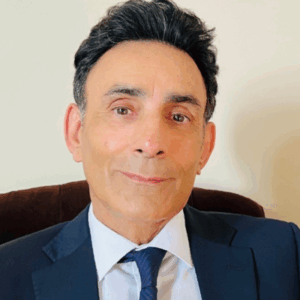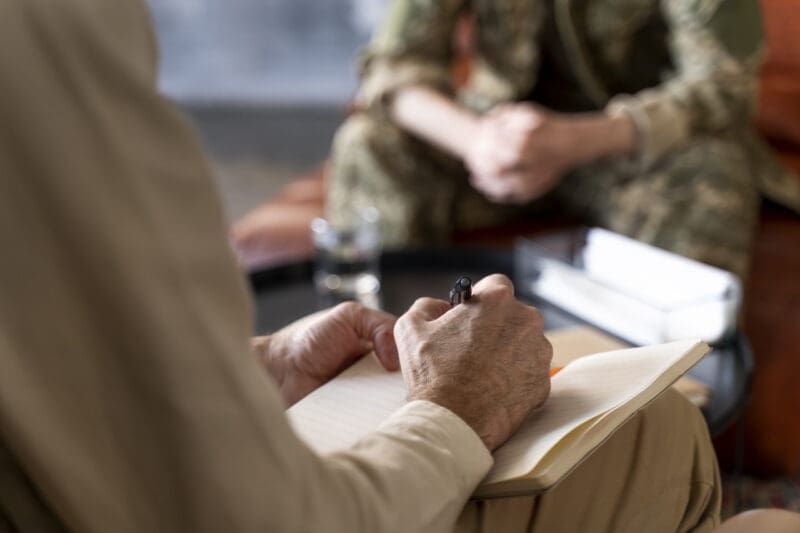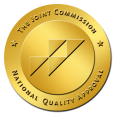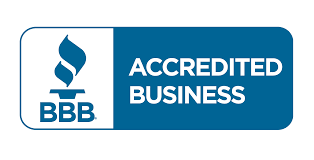

About 12,000 Kentucky veterans are currently living with post-traumatic stress disorder (PTSD) — a reminder that trauma is a local as well as a global public-health issue, and combat experience isn’t the only pathway to PTSD.
In and around Louisville, survivors of car crashes on I-65, severe weather events, sexual assault, domestic violence, workplace accidents, and childhood abuse also look for relief from intrusive memories, hyper-arousal, and avoidance.
When these symptoms linger, many people reach for alcohol or drugs to numb the pain, creating an even steeper climb back to stability.
Louisville Addiction Center offers PTSD treatment in Louisville that combines evidence-based PTSD therapy with dual diagnosis support so that clients can address trauma roots and substance use fallout in one coordinated plan.
Post-traumatic stress disorder is a mental health condition that develops after exposure to actual or threatened death, serious injury, or sexual violence. According to the Diagnostic and Statistical Manual of Mental Disorders, Fifth Edition (DSM-5), a diagnosis requires symptoms lasting longer than one month in four domains: intrusive recollections, avoidance, negative mood or cognition changes, and heightened arousal or reactivity.
The disorder is rooted in the body’s survival circuitry. During danger, the sympathetic nervous system triggers a fight-or-flight response—racing heart, rapid breathing, and sharpened senses—to help us escape or confront threats.
When neither escape nor defense is possible, the system can “freeze,” storing the event as an unresolved alarm. For most people, this stress cascade settles with time; for those with PTSD, the alarm keeps sounding, even in safe situations, disrupting sleep, concentration, relationships, and overall health.
Effective care teaches the brain and body to recognize safety again through therapies such as cognitive-behavioral interventions, eye-movement desensitization and reprocessing (EMDR), and mindfulness-based skills.

Living with PTSD feels like carrying an internal alarm that never fully shuts off. Clinicians group the disorder’s warning lights into four main clusters.
Below, you’ll see how each set of symptoms can surface during everyday moments in Louisville—whether you’re driving the Kennedy Bridge, watching Thunder Over Louisville, or simply trying to fall asleep on a quiet night.
Flashbacks, vivid nightmares, or distressing memories can barge in without warning. A backfiring engine on I-65 might yank someone straight back to a roadside bomb in Kabul, while the smell of smoke from a Bardstown Road food-truck festival could resurrect memories of a house fire. These episodes feel so real that people may freeze, lose track of time, or relive the event in full sensory detail.
These are considered intrusive because the person cannot control these thoughts. Oftentimes, these intrusions occur when something reminds a person of the traumatic event. These thoughts can also occur when a person isn’t engaged in any activity, which is why many people with PTSD cannot seem to sit still or relax.
Exaggerated startle responses and constant hyper-vigilance make it hard to unwind. Sirens echoing through downtown after a Cardinals game or fireworks booming during Thunder Over Louisville can spike heart rate, muscle tension, and irritability. Many people describe sleeping “with one eye open,” jolting awake at the slightest noise, or snapping at loved ones for minor disruptions.
A person with PTSD can struggle to remain calm or feel at ease. Following the traumatic event, they are on “high alert” and looking for the next potential threat. As a result, they might be hyper-vigilant and overly reactive. For their loved ones, this might look like outbursts of anger, irritability, or agitation. They could also become paranoid, easily startled, and have a difficult time sleeping.
Chronic stress hormones can darken outlook and cloud thinking. A neighbor’s harmless knock might trigger a surge of paranoia; negative self-talk (“I’ll never be safe”) can spiral into guilt or shame. Concentration suffers, too—college students at UofL may reread the same textbook page for hours, while workers on Whiskey Row struggle to meet deadlines because their mind keeps drifting back to the worst-case scenario.
Over time, intrusive thoughts and hyper states of arousal can lead to mood swings and cognitive issues. The person’s mood can fluctuate from moment to moment, and they might be easily set off if they feel triggered. In addition, sleep disturbances, intrusive thinking, and an inability to rest can cause cognitive issues. Thus, they might struggle to focus and concentrate. They can also develop distorted or negative beliefs about themselves and the world around them.
To dodge reminders, people create shrinking comfort zones. A survivor of the 2023 Eastern KY floods may refuse to drive past the riverfront, while a veteran might skip Fourth of July gatherings to avoid explosions. Avoidance can also be internal—pushing away thoughts through overwork, isolation, or turning to alcohol at NuLu bars to numb the ache.
Recognizing these patterns early opens the door to effective PTSD therapy before self-medication or social withdrawal deepens wounds.
One of the most common maladaptive coping strategies for those with PTSD is avoidance. Avoidance behaviors are a person’s way of keeping themselves protected from trauma triggers. They might avoid certain people, places, or situations that remind them of their trauma. Furthermore, they might attempt to avoid thinking about trauma, which could lead to substance abuse as a way of numbing themselves or avoiding intrusive thoughts. Lastly, they might avoid talking about their trauma altogether. Thus, they avoid therapy and any attempts at getting help as well.

A chronically “on-edge” brain craves relief. In PTSD, an overactive amygdala keeps flooding the body with stress hormones while blunting the prefrontal cortex’s impulse control. Alcohol, opioids, or benzodiazepines momentarily quiet that alarm by boosting dopamine and slowing the central nervous system—so the cycle sticks. Veterans illustrate the risk vividly: among VA users in fiscal-year 2024, 14 percent of men and 24 percent of women carried a PTSD diagnosis, rates far higher than the general population.
Studies show that vets who screen positive for PTSD are significantly more likely to meet criteria for a substance-use disorder (SUD) and to have worse treatment outcomes when the two conditions collide.
That’s why Louisville Addiction Center treats trauma and SUD together, preventing “symptom swapping” and giving clients healthier neurochemical off-ramps.
PTSD treatment often includes many approaches and therapies. At Louisville Addiction Center, we believe in treating the whole person in recovery from PTSD. This means that we offer traditional therapies as well as holistic approaches to address a person’s physical and spiritual well-being. We also offer dual diagnosis treatment for those with PTSD and a substance use disorder.
However, treating PTSD requires some specialized therapies specific to this diagnosis. PTSD treatment in Louisville, Kentucky, includes the following:

Therapists help clients map the links between traumatic memories, distorted thoughts (“I’m never safe”), and self-defeating behaviors. By testing and replacing those thoughts, people gain practical tools to defuse triggers and reclaim daily routines—all sessions take place in our outpatient offices.
CBT is among the most common types of talk therapy. In fact, many other therapies are variations of CBT. During CBT, a therapist helps their client identify and change distorted or negative thought patterns. By working through these unhelpful thoughts, a person’s behaviors and moods can shift as well.

DBT is a type of CBT that specializes in treating extreme behavioral patterns as well as emotional regulation and thought distortions.
Clients learn mindfulness, crisis-survival tactics, and interpersonal effectiveness to manage rapid mood swings or self-harm urges. Weekly DBT skills groups and individual coaching are offered on-site.

A therapist guides the client’s gaze to a “brain spot” that ignites somatic discomfort; holding focus there while processing the event releases stored trauma. Brainspotting sessions occur in our private therapy suites and complement EMDR for clients needing deeper, body-based work.

Eye movement desensitization and reprocessing (EMDR) is an innovative, evidence-based practice for PTSD and other mental health disorders. During EMDR, a therapist will use bilateral stimulation to help the client remain in a calm state while working through their trauma. Most therapists use eye movements, where they ask their clients to follow an object from left to right with their eyes. However, other sensations can be used, such as auditory stimulation or touch.

Gentle yoga flows, guided breathing, and meditation retrain the vagus nerve to shift from fight-or-flight into rest-and-digest. Classes meet twice daily in the wellness studio and are led by instructors certified in trauma-informed practice.

Psychiatrists evaluate whether SSRIs, prazosin (for nightmares), or non-addictive anxiolytics can stabilize mood while therapy does its work. Medication plans are reviewed bi-weekly alongside vitals and sleep data to ensure efficacy and safety.
Together, these six pillars give clients multiple pathways to calm the body, reframe the mind, and build a lasting recovery from both PTSD and substance misuse.
Louisville Addiction Center offers a full continuum of outpatient care designed to treat PTSD and trauma alongside substance-use challenges. Every level is staffed by licensed therapists trained in EMDR, DBT, and other trauma-informed modalities, so clients never have to “start over” as they step down the ladder of support.

Partial Hospitalization Program (PHP). Running five days a week for about six hours per day, PHP gives clients intensive therapy, daily psychiatric check-ins, and peer groups that focus on grounding skills and relapse prevention. Because evenings are spent at home or in sober living, participants can practice coping techniques in real-world settings while still having next-morning clinical backup.

Intensive Outpatient Program (IOP). For those who need structure but must keep work or family commitments, IOP condenses trauma groups, individual sessions, and medication reviews into three-hour blocks scheduled three to five times weekly. Flexible day and evening tracks let clients maintain employment while continuing evidence-based PTSD therapy.

Outpatient Program (OP). Once acute symptoms stabilize, OP offers one to three hours of counseling per week plus monthly psychiatric follow-ups. This stage focuses on strengthening community ties, refining relapse-prevention plans, and rehearsing stress-management skills learned earlier in treatment.

Dual-Diagnosis Track. All programs integrate mental-health and addiction care; clinicians meet weekly to adjust treatment plans so neither condition is left behind.

Veteran Liaison Services. A dedicated veteran-services coordinator helps clients navigate TRICARE, file benefit paperwork, and join trauma-specific peer groups—recognizing that military trauma often requires culturally competent support.

The holistic approach aims to treat the person as a “whole.” This means treatment integrates the physical, emotional, spiritual, and mental well-being of the patient. Rather than focusing on a narrow problem, holistic therapy considers multiple areas to improve a person’s physical and mental health.



Even after therapy ends for the day, community connections keep recovery momentum alive. Explore these Louisville-area organizations—and take a virtual Facility Tour to see where your healing begins:
These partners, along with Louisville Addiction Center’s trauma-informed clinicians, create a wraparound safety net so you can practice new skills in real-world settings and never walk the path alone.

Louisville Addiction Center believes results matter, so every treatment plan includes measurable goals and routine progress checks. We track attendance, symptom-reduction scores, and relapse-prevention milestones from admission through aftercare.
Preliminary internal reviews show that most clients maintain engagement with therapy, peer support, or medication follow-ups six months after discharge, and many record meaningful drops on the PTSD Checklist (PCL-5) by week twelve. Formal outcome data for 2025 are being compiled now and will be shared on this page once verified.
Until then, national outpatient studies report that about 60 percent of adults in evidence-based trauma programs achieve clinically significant symptom relief within three months—standards we aim to meet or exceed through continuous quality improvement and evidence-based care.
Healing doesn’t stop when your session ends. Our trauma-recovery blog features weekly posts with step-by-step coping skills, updates on local mental-health initiatives, and real stories of resilience from Louisville veterans and civilians alike.
Browse the archive to find quick grounding exercises, explanations of new therapies, and guides to community resources you may not have discovered yet.
Bookmark your favorite articles or share them with friends and family who want to better understand—and support—your journey to lasting recovery.

One call can change everything. Call to speak with an admissions specialist or reach out online.
After a brief clinical screening, we’ll match you with PHP, IOP, or OP and review payment options—no hidden fees.
When clinically appropriate, we can schedule same- or next-day assessments, arrange transportation, and provide work-leave paperwork so you can focus on healing. Your path to calmer days and restful nights starts right here at Louisville Addiction Center.




Louisville Addiction Center is in-network with most major commercial insurers. We verify benefits before admission, explain co-pays and deductibles, and offer clear self-pay rates or financing if you’re uninsured—no surprise bills.
Partial Hospitalization typically spans four weeks; Intensive Outpatient averages six to eight; standard Outpatient may continue as needed. Your therapist reviews progress every week and adjusts timelines so you never stay longer—or leave sooner—than clinically necessary.
After an initial in-person assessment, many individual sessions, evening skills groups, and medication follow-ups can be completed via encrypted video. Telehealth keeps you connected when travel, childcare obligations, or mobility issues make on-site visits difficult.
We host weekly education nights, offer optional joint therapy, and share progress updates through a secure portal (with your consent). Loved ones learn trauma basics, healthy communication, and relapse-warning signs, turning home life into an extension of treatment.
Yes. A dedicated veteran liaison guides VA paperwork, accepts TRICARE referrals, and runs trauma groups tailored to combat experiences. Culturally competent staff help translate military triggers into exposure hierarchies that promote lasting symptom relief.
The first-line medications we prescribe—SSRIs, SNRIs, and prazosin for nightmares—are non-addictive. When short-term anxiolytics are clinically necessary, doses are closely monitored and paired with therapy to prevent dependence and to taper safely if symptoms improve.
Yes. Our Intensive Outpatient Program offers morning and evening tracks so you can fit three-hour therapy blocks around a full- or part-time schedule. We also supply documentation for FMLA, short-term disability, or university accommodations when needed.
Louisville Addiction Center provides EMDR, Brainspotting, CBT, DBT, trauma-focused yoga, and mindfulness groups under one roof. Having every modality in-house means you won’t have to juggle outside referrals or retell painful stories to multiple providers.
Absolutely. Our case-management team assists with court letters, probation reports, employer verification, and military or VA documentation. Quick turnaround keeps external obligations from stalling your treatment progress.
Get Family Support Now
We understand addiction affects the whole family. Our comprehensive family program helps rebuild trust and restore relationships.
Weekly Family Therapy Sessions
Educational Workshops
Support Groups
Communication Skills Training
American Psychological Association. (2025, February). Clinical practice guideline for the treatment of PTSD in adults. American Psychological Association. https://www.apa.org/ptsd-guideline/ptsd.pdf Cambridge University Press & Assessment+15American Psychological Association+15American Psychological Association+15
American Psychological Association. (2025, August). Guidelines on key considerations for working with adults with PTSD and traumatic stress disorders. Author. https://www.apa.org/about/policy/adults-ptsd-traumatic-stress-guidelines.pdf American Psychological Association+1
American Psychological Association. (2025, July–August). PTSD and trauma: New APA guidelines highlight evidence‑based treatments. Monitor on Psychology. https://www.apa.org/monitor/2025/07-08/guidelines-treating-ptsd-trauma American Psychological Association+2American Psychological Association+2
Merz, J., Schwarzer, G., & Gerger, H. (2019). Comparative efficacy and acceptability of pharmacological, psychotherapeutic, and combination treatments in adults with posttraumatic stress disorder: A network meta-analysis. JAMA Psychiatry, 76(9), 904–913. https://doi.org/10.1001/jamapsychiatry.2019.0951 JAMA Network
Weber, M., Schumacher, S., Hannig, W., Barth, J., Lotzin, A., Schäfer, I., Ehring, T., & Kleim, B. (2021). Long‑term outcomes of psychological treatment for posttraumatic stress disorder: A systematic review and meta‑analysis. Psychological Medicine, 51(9). https://doi.org/10.1017/S0033291721001182 Cambridge University Press & Assessment
Morina, N., Hoppen, T. H., & Kip, A. (2021). Study quality and efficacy of psychological interventions for posttraumatic stress disorder: A meta‑analysis of randomized controlled trials. Journal of Psychiatric Research, approximately 136 trials (N = 8,978). https://doi.org/10.1016/j.jpsychires.2020.09.002 Cambridge University Press & Assessment
Yunitri, N., Chu, H., Kang, X. L., Wiratama, B. S., Lee, T.‑Y., Chang, L.‑F., Liu, D., Kustanti, C. Y., Chiang, K.‑J., Chen, R., Tseng, P., & Chou, K.‑R. (2023). Comparative effectiveness of psychotherapies in adults with posttraumatic stress disorder: A network meta-analysis of randomized controlled trials. Psychological Medicine, 53(13), 6376–6388. https://doi.org/10.1017/S0033291723001182 EMDR International Association
— Additional treatment modalities:
— Exposure Therapy: A meta-analysis demonstrating large effects relative to control conditions, with stable follow-up effects and some superiority to medication in medium effect size. VA Meta-Analysis American Psychological Association+2The Sun+2PTSD VA+1
— EMDR (Eye Movement Desensitization and Reprocessing): Recognized as a first-line, trauma-focused psychotherapy, supported by multiple systematic reviews including Cochrane and recent RCTs. EMDR Effectiveness Overview en.wikipedia.org+13en.wikipedia.org+13en.wikipedia.org+13
— TF-CBT (Trauma-Focused Cognitive Behavioral Therapy): Gold‑standard therapy for PTSD, especially in children and adolescents, with demonstrated effectiveness in 28 RCTs and support for adult use. TF-CBT Overview en.wikipedia.org+1
— CPT (Cognitive Processing Therapy): Manualized, well‑validated CBT approach, effective across diverse PTSD populations in both individual and group formats. CPT Overview en.wikipedia.org+5en.wikipedia.org+5EMDR International Association+5
— NET (Narrative Exposure Therapy): Short‑term, trauma-focused therapy with evidence of reducing PTSD and depression; conditionally recommended by APA. NET Overview en.wikipedia.org+1
— MDMA-Assisted Psychotherapy: Identified as a promising adjunctive therapy with breakthrough status by the FDA in 2017; early data suggest potential effectiveness in PTSD treatment. MDMA-Assisted Psychotherapy Overview en.wikipedia.org+1









American Psychological Association. (2025, February). Clinical practice guideline for the treatment of PTSD in adults. American Psychological Association. https://www.apa.org/ptsd-guideline/ptsd.pdf Cambridge University Press & Assessment+15American Psychological Association+15American Psychological Association+15
American Psychological Association. (2025, August). Guidelines on key considerations for working with adults with PTSD and traumatic stress disorders. Author. https://www.apa.org/about/policy/adults-ptsd-traumatic-stress-guidelines.pdf American Psychological Association+1
American Psychological Association. (2025, July–August). PTSD and trauma: New APA guidelines highlight evidence‑based treatments. Monitor on Psychology. https://www.apa.org/monitor/2025/07-08/guidelines-treating-ptsd-trauma American Psychological Association+2American Psychological Association+2
Merz, J., Schwarzer, G., & Gerger, H. (2019). Comparative efficacy and acceptability of pharmacological, psychotherapeutic, and combination treatments in adults with posttraumatic stress disorder: A network meta-analysis. JAMA Psychiatry, 76(9), 904–913. https://doi.org/10.1001/jamapsychiatry.2019.0951 JAMA Network
Weber, M., Schumacher, S., Hannig, W., Barth, J., Lotzin, A., Schäfer, I., Ehring, T., & Kleim, B. (2021). Long‑term outcomes of psychological treatment for posttraumatic stress disorder: A systematic review and meta‑analysis. Psychological Medicine, 51(9). https://doi.org/10.1017/S0033291721001182 Cambridge University Press & Assessment
Morina, N., Hoppen, T. H., & Kip, A. (2021). Study quality and efficacy of psychological interventions for posttraumatic stress disorder: A meta‑analysis of randomized controlled trials. Journal of Psychiatric Research, approximately 136 trials (N = 8,978). https://doi.org/10.1016/j.jpsychires.2020.09.002 Cambridge University Press & Assessment
Yunitri, N., Chu, H., Kang, X. L., Wiratama, B. S., Lee, T.‑Y., Chang, L.‑F., Liu, D., Kustanti, C. Y., Chiang, K.‑J., Chen, R., Tseng, P., & Chou, K.‑R. (2023). Comparative effectiveness of psychotherapies in adults with posttraumatic stress disorder: A network meta-analysis of randomized controlled trials. Psychological Medicine, 53(13), 6376–6388. https://doi.org/10.1017/S0033291723001182 EMDR International Association
— Additional treatment modalities:
— Exposure Therapy: A meta-analysis demonstrating large effects relative to control conditions, with stable follow-up effects and some superiority to medication in medium effect size. VA Meta-Analysis American Psychological Association+2The Sun+2PTSD VA+1
— EMDR (Eye Movement Desensitization and Reprocessing): Recognized as a first-line, trauma-focused psychotherapy, supported by multiple systematic reviews including Cochrane and recent RCTs. EMDR Effectiveness Overview en.wikipedia.org+13en.wikipedia.org+13en.wikipedia.org+13
— TF-CBT (Trauma-Focused Cognitive Behavioral Therapy): Gold‑standard therapy for PTSD, especially in children and adolescents, with demonstrated effectiveness in 28 RCTs and support for adult use. TF-CBT Overview en.wikipedia.org+1
— CPT (Cognitive Processing Therapy): Manualized, well‑validated CBT approach, effective across diverse PTSD populations in both individual and group formats. CPT Overview en.wikipedia.org+5en.wikipedia.org+5EMDR International Association+5
— NET (Narrative Exposure Therapy): Short‑term, trauma-focused therapy with evidence of reducing PTSD and depression; conditionally recommended by APA. NET Overview en.wikipedia.org+1
— MDMA-Assisted Psychotherapy: Identified as a promising adjunctive therapy with breakthrough status by the FDA in 2017; early data suggest potential effectiveness in PTSD treatment. MDMA-Assisted Psychotherapy Overview en.wikipedia.org+1









Addiction and co-occurring disorders don’t have to control your life. Louisville Addiction Center is waiting with open arms to give you the tools necessary for lasting change. Reach out to us today to learn more.
Get Family Support Now
We understand addiction affects the whole family. Our comprehensive family program helps rebuild trust and restore relationships.
Weekly Family Therapy Sessions
Educational Workshops
Support Groups
Communication Skills Training
Hear directly from those who have walked the path to recovery. Our patients’ stories highlight the compassionate care, effective programs, and life-changing support they’ve experienced. Let their journeys inspire you as you take your first steps toward healing.
Louisville Addiction Center is helping people in Kentucky overcome addiction and mental health challenges.